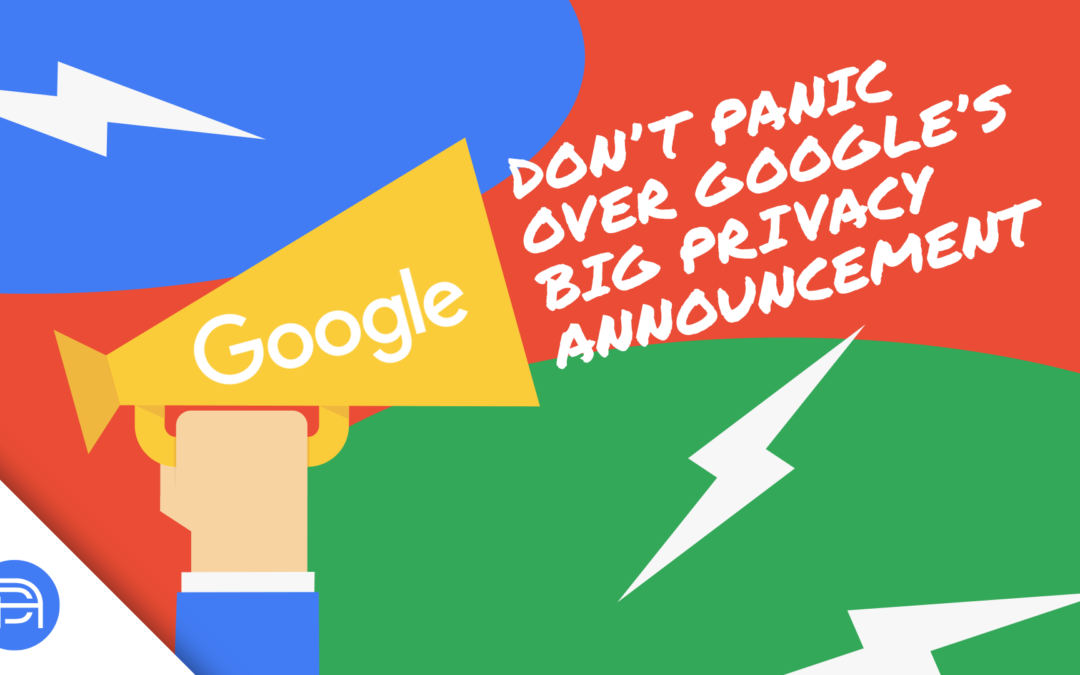If you were listening closely you might have heard the simultaneous cheers of privacy advocates and groans of digital marketers on Wednesday morning as Google made a major announcement regarding privacy. In groundbreaking news, Google has declared that they will no longer sell ads using personally identifiable information for web browsers.
This announcement comes on the heels of a previous declaration from Google stating that its Chrome browsers would be phasing out support for third-party cookies by 2022. It now is clear that once these third-party cookies are phased out there will be no alternative identifier to track users across the internet.
Wow. Deep breath. Ok…
What does this Privacy Announcement mean?
Internet-Based Advertising
Get used to the new acronym, FLoC, you are going to be hearing it a lot! It stands for Federated Learning of Cohorts. This is a fancy way of saying Google will be clustering large groups of people with similar interests for businesses to reach people with relevant content and ads. Google has made the bold claim that this type of targeting will be just as effective as cookie-based.
Browser Bidding
Another bird-related acronym you should familiarize yourself with is FLEDGE. It stands for First Locally-Executed Decision over Groups Experiment. FLEDGE makes ad auction decisions on the browser, rather than on ad server level. In theory, this helps protect user privacy by narrowing the amount of data flowing in the ad system. If bid and targeting decisions happen at the browser or device level, there will be less user data to use to build user profiles.
Audience Creation
Remarketing, remarketing, remarketing. As third-party data goes, Google is stepping up its push on using first-party to re-engage users already familiar with your brand.
Conversion Measurement
It is still not completely clear how conversions will be measured in a cookie-less world, but rest assured that Chrome has proposed a number of solutions. According to Google, “these proposals protect consumer privacy while supporting key advertiser requirements, such as event-level reporting that enables bidding models to recognize patterns in the data, and aggregate-level reporting which delivers accurate measurement over groups of users.”
Ad Fraud Prevention
Without third-party data, there are concerns that it will now be more difficult to distinguish between actual visitors from fraudulent traffic. Google has already begun testing the Trust Token API to help verify authentic traffic without exposing identities.
What can we do to prepare?
While these changes won’t be happening immediately, now is not the time to treat Google like the one that got away and sit around and wait for them. There are proactive steps brands and their partners can take to be more prepared for this cookie-less world we are all venturing into together.
Invest in a Customer Data Platform
Now that third-party data may be a thing you tell your grandchildren about let’s focus on first-party. A CDP will combine data from multiple sources to create a database of your customers to more easily remarket across channels. Organizing your customer lists is going to be essential in this new world of marketing.
Sitewide Tagging
Google recommends customers implement sitewide tagging with the global site tag or Google Tag Manager in order to minimize disruptions during the phasing out of third-party cookies.
Tighten Up Your SEO
Another area that you should already be focusing on is SEO. But if you have been neglecting it lately now is the time to invest and prep. With the volatility that is PPC, organic search could help to pick up the slack.
Be prepared to pay more for ads on Google Properties
If you are not already dabbling in Google paid search, Shopping campaigns, YouTube campaigns, and the Google Display Network then you are likely missing out on a large chunk of your potential audience. At this point, Google IS the searchable internet. Third-party data may be going away, but Google is still where over 90% of internet searches happen. But these changes mean that in order to get all the juice out of the lemon that is Google you are going to have to squeeze a bit harder starting in 2022. I hope your CFO likes lemonade.
In the ever-changing world that is digital marketing, this announcement is just one of many we have and will continue to see as the tech giants of Google, Apple, and Facebook do everything they can to calm consumers’ fear over privacy…. while still turning impressive profits. These changes do not make it any less important to invest in digital paid advertising, it will just require creative solutions in how, where, and what to invest in. Direct Agents is here to help your company make these tough decisions.
– Andrea Duffy-Cabana, Senior Search Analyst
Reach out to us at [email protected] to learn more about how the experts at Direct Agents can help guide your brand through these privacy changes.

